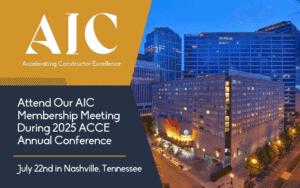In the construction industry, ethical practice is one of the cornerstones of a strong company. Maintaining a system of competence, managerial excellence, and fair dealings helps your company and elevates the entire industry.
As a construction manager, you operate as the moral compass for all projects and employees, so it’s crucial that you have a good understanding of why ethics is so valuable to the construction field.
The American Institute of Constructors (AIC) operates around a strict ethical commitment centered on the AIC Code of Ethics. Following the seven points in our Code will establish you as a leader in construction workforce management.
What Does Ethics Mean in Construction Workforce Management?
In construction, ethics embodies a set of principles and standards that guide the moral conduct of both individuals and organizations. It includes a wide range of considerations, including:
- Construction worker safety
- Transparent business practices
- Environmental sustainability
- Community welfare
As a construction manager, you need to be aware of many ethical situations for each construction project. By leveraging communication and creating a safe workspace, you’ll set an example for the constructors on your team. The overall benefit is a more ethically sound, organized workforce that supports project owners, investors, and executives.
We recommend that you keep the following ideas in mind to create a better workplace, support good workforce management, and contribute to a more ethical future.
Safety is Key
One of the key points for maintaining an ethical environment is ensuring the well-being of everyone involved in the process. This effort can take the form of establishing rigorous safety protocols, providing proper training in real-time, and ensuring each project complies with OSHA regulations and safety standards to prevent accidents and injuries.
By instituting a policy of assessment, repair, and review, a construction manager can help reduce the risk of incidents. Then, when workers are more confident in their surroundings and their leadership, jobs are completed more effectively and efficiently.
Knowing that everyone has everyone else’s backs in the workplace helps foster a sense of community and creates an inclusive culture that contributes to the well-being of your employees and the morale of the company.
Sustainability for the Future
Because of the industry’s significant impact on the planet, environmental ethics are also crucial. Making a concerted effort to adhere to sustainable practices, minimize waste, and use eco-friendly materials will reduce your carbon footprint and contribute to the long-term health of the environment and community.
It can be tempting to take the quicker, cheaper shortcut when disposing of waste or dealing with suppliers. However, building healthy relationships with stakeholders should always be a priority.
Spending a little more on materials or implementing energy-saving or sustainable practices that take a little longer will help in two key ways:
- Ensure the eco-friendliness of each job site.
- Positively impact the communities in which your company operates.
Fair Practices
Perhaps one of the most visible places where ethics comes into play is ethical dealings with other parties. In the past, bad actors sullied the industry by cutting corners or engaging in practices that were not above board.
It is then crucial that today’s general contractors embrace honesty in bidding processes, contract negotiations, shared labor costs, and project management to build trust among clients, stakeholders, and workers. This effort can lead to more fruitful projects and minimize the risk of disputes that can lead to delays and cost overruns.
Community & Inclusion
People are the most important asset in the construction industry. Individuals and the experiences they bring to the table drive everything forward. That’s why it’s always important to foster a sense of community and inclusion in the workplace that lifts everyone up and leaves no room for unethical practices.
Companies should focus on providing fair wages, reasonable working hours, and proper working conditions to every member of the team. It is also vital to foster an inclusive construction environment by proactively engaging with your workforce.
Beyond the individual, community ethics involves being a good neighbor. Minimizing disruptions to local communities, adhering to zoning regulations, and engaging with the public on project impacts all help foster harmonious relationships between construction companies, their projects, and the neighborhoods they affect.
Why Ethics Matter
Ethics matter for a variety of reasons in the construction field. Ultimately, they bolster the industry’s reputation and credibility.
By emphasizing best practices and keeping up-to-date on regulations and sustainable endeavors, a company can attract more skilled professionals, responsible investors, and conscientious clients who prioritize ethical considerations.
A proactive approach will lead to an increase in morale, help the environment in the long term, and establish your company as a team that can be trusted.
By embracing ethics, the construction industry can improve its practices and contribute to society while maintaining high standards of professionalism and integrity.
AIC is Committed to Supporting the Construction Workforce
At AIC, ethics is one of our core values. Our members work tirelessly to create new opportunities and spread knowledge throughout our network, which is integral to maintaining a positive outlook on the construction field as a whole.
By following the AIC Code of Ethics for Constructors and taking the Construction Creed, construction managers signal their commitment to advancing fair and unbiased practices in the industry. Partnering with AIC is a powerful signal that you’re ready to uphold ethics.
Learn More About the Benefits of Construction Workforce Management
Want to grow your commitment to ethics in the industry? Follow AIC on LinkedIn. We’re constantly posting new information about programming, projects, and how our members are upholding our Code of Ethics.
Benefit from interviews with fellow constructors, access industry-specific articles, find workforce management tools, and connect with other companies who are making a positive difference in construction workforce management.




